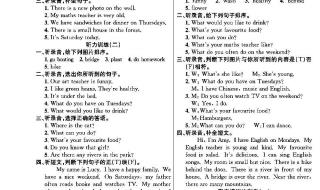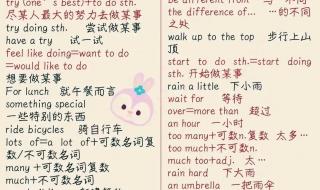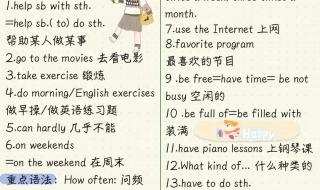初中英语的所有知识点
初中英语知识点总结1
一、词类:英语词类分以下十种:名词、形容词、代词、数词、冠词、动词、副词、介词、连词、感叹词。
1、名词(n.): 表示人、事物、地点或抽象概念的名称。如:boy, morning, bag, ball, class, orange.
2、代词(pron.): 主要用来代替名词。如:who, she, you, it .
3、形容词(adj..):表示人或事物的性质或特征。如:good, right, white, orange .
4、数词(num.): 表示数目或事物的顺序。如:one, two, three, first, second, third, fourth.
5、动词(v.): 表示动作或状态。如:am, is,are,have,see .
6、副词(adv.): 修饰动词、形容词或其他副词,说明时间、地点、程度等。如:now, very, here, often, quietly, slowly.
7、冠词(art..):用在名词前,帮助说明名词。如:a, an, the.
8、介词(prep.): 表示它后面的名词或代词与其他句子成分的关系。如in, on, from, above, behind.
9、连词(conj.): 用来连接词、短语或句子。如and, but, before .
10、感叹词(interj..)表示喜、怒、哀、乐等感情。如:oh, well, hi, hello.
二、句子成分:英语句子成分分为七种:主语、谓语、宾语、定语、状语、表语、宾语补足语。
1、主语是句子所要说的人或事物,回答是“谁”或者“什么”。通常用名词或代词担任。如:I'm Miss Green.(我是格林小姐)
2、谓语动词说明主语的动作或状态,回答“做(什么)”。主要由动词担任。如:Jack cleans the room every day. (杰克每天打扫房间)
3、表语在系动词之后,说明主语的身份或特征,回答是“什么”或者“怎么样”。通常由名词、代词或形容词担任。如:My name is Ping ping .(我的名字叫萍萍)
4、宾语表示及物动词的对象或结果,回答做的是“什么”。通常由名词或代词担任。如:He can spell the word.(他能拼这个词)
有些及物动词带有两个宾语,一个指物,一个指人。指物的叫直接宾语,指人的叫间接宾语。间接宾语一般放在直接宾语的前面。如:He wrote me a letter . (他给我写了一封信)
有时可把介词to或for加在间接宾语前构成短语,放在直接宾语后面,来强调间接宾语。如:He wrote a letter to me . (他给我写了一封信)
5、定语修饰名词或代词,通常由形容词、代词、数词等担任。如:
Shanghai is a big city .(上海是个大城市)
6、状语用来修饰动词、形容词、副词,通常由副词担任。如:He works hard .(他工作努力)
7、宾语补足语用来说明宾语怎么样或干什么,通常由形容词或动词充当。如:They usually keep their classroom clean.(他们通常让教室保持清洁) / He often helps me do my lessons.(他常常帮我做功课) / The teacher wanted me to learn French all by myself.(老师要我自学法语)
☆同位语通常紧跟在名词、代词后面,进一步说明它的情况。如:Where is your classmate Tom ?(你的同学汤姆在哪里?)
三、构词法:英语构词法主要有:合成法、派生法和转换法。
1、合成法:如:spaceship, headache, basketball, playground等等。
2、派生法:
(1)派生名词:①动词+er/or ②动词+ing ③动词+(t)ion ④形容词+ness ⑤其他,如:inventor, learner, swimming, congratulation, kindness, carelessness, knowledge
(2)派生形容词:①名词+y ②名词+ful ③动词+ing/ed ④friendly ⑤dangerous ⑥Chinese; Japanese ⑦English ⑧French ⑨German ⑩国名+(i)an 如:snowy, sunny, hopeful, beautiful, interesting, follwing, daily(每日的),nervous, delicious
(3)派生副词:①形容词+ly ②其它,如:slowly, angrily, full→fully, good→well, possible→possibly等等。
3、转换法:
(1)形容词→动词,如:dry(干燥的)→dry(弄干), clean(干净的)→clean(打扫,弄干净),等等。
(2)动词→名词,如:look, walk, rest, work, study, swim, go, talk等等。
(3)名词→动词,如:hand(手)→(传递),face(脸)→(面对)等等。
(4)形容词→副词,如:early→early, fast→fast等等。
(5)副词→连词,如:when(什么时候)→(当……时候),等等。
(6)介词→副词,如:in(到……里)→(在里面;在家),on(在…上)→(进行,继续),等等。

六年级上册英语牛津版语法知识点
一、a number of ,the number of
a number of 意思是“许多”,相当于a lot of ; the number of意思是“……的数目,……的数量”,当它作主语时,谓语动词用单数形式。
A number of students like playing computer games.
许多学生喜欢玩电脑游戏。
The number of the students is about 1500 in our school.
我们学校学生的人数大约是1500。
二、基数词变序数词助记歌。
基变序,有规律,末尾加上th;一、二、三特殊记,八加h ,九去e ,ve要用f替;以e结尾变ie,后跟th莫忘记。要想表示几十几,只变个位就可以。
特殊变化:one—first ,two—second ,three—third ,five—fifth ,
nine—ninth ,twelve—twelfth ,forty—fortieth ,
eight-nine—eighty-ninth
三、概数(略数)表达法
数词+hundred/thousand/million/billion+名词复数
hundreds/thousands/millions/billions of+名词复数
例1
1. __people go swimming in summer in Dalian.
A、Thousands B、Thousand of C、Thousands of D、Thousand
2. __the students will take part in this English speech contest.
A. Two hundred of B. Two hundreds of C. Hundreds of D. Hundred of
一、of sb.与for sb.的区别
(1)of sb.“对于(某人)”,用于It is +adj. +of sb. to do sth.句型中,形容词为clever, kind, nice等描述人物性格特征的词,of后的人物与形容词有主表关系。
(2)for sb.“对于(某人)”,用于It is +adj. +for sb. to do sth.句型中, 形容词为easy, important等不描述人物性格特征的词,for后的人物与形容词没有主表关系。

高考英语基础知识点

1. be fond of “喜爱,爱好” 接名词、代词或动词的-ing形式。
He’s fond of swimming. 他喜欢游泳。
Are you fond of fresh vegetables. 你喜欢新鲜蔬菜吗?
He is fond of his research work. 他喜爱他的研究工作。
2. hunt for = look for 寻找
I have found the book I was hunting for.我找到了那本我在找的书。
hunt for a job 找工作
3. in order to/so as to:这两个词组都可引导不定式作目的状语, in order to可放于句首, so as to则不能, 其否定形式为in order not to / so as not to.
He went to Beijing in order / so as to attend an important meeting.
In order to be noticed, he shouted and waved to us.为了让我们注意他, 他朝我们又是叫喊又是挥手。
4. care about
1) 喜欢,对……有兴趣 = care for
She doesn’t care about money.她不喜欢钱。
2)关心 = care for
She thinks only of herself. She doesn’t care about other people.她只考虑自己。她不关心别人。
3)在乎,在意(接从句或不接任何成分)
These young people care nothing about what old people might say.
这些年轻人根本不在乎老人说的话。
5. such as 意为“诸如……”,“像……”,是用来列举人或事物的。
She teaches three subjects, such as physics and chemistry.她教三门科目,像物理、化学。
6. drop a line 留下便条, 写封短信
7. make yourself at home 别客气;随便;无拘束
If you get to my house before I do, help yourself to a drink and make yourself at home.如果你在我之前到我家,自己喝点饮料,随便一点。
8. stay up 不睡;熬夜
(1) I'll be late home, don't stay up for me.
我将回家很晚,不要等我了。
(2) He stayed up reading until 2:00 in the morning.
他熬夜看书直到凌晨两点。
9. come about 引起;发生;产生
(1)How did the accident come about?
这场事故是怎么发生的?
(2) They didn't know how the change had come about.
他们不知道这个变化是怎样产生的。
10. except for 除……之外
(1) except 与 except for 的用法常有区别。except 多用于引起同类事物中被排除的一项。如:
①He answered all the questions except the last one.
除去最后一个,他回答了所有问题。
②We go there every day except Sunday.
除了星期天,我们天天去那里。
(2)except for 用于引述细节以修正句子的主要意思。如:
①Except for one old lady, the bus was empty.
除去一个老太太,这辆公共汽车全空了。
②Your picture is good except for the colours.
你的画儿很好,只是某些色彩有问题。
(3)但在现代英语中,except for也用于表示except的意思。如上述第一个例子可以是:
He answered all the questions except for the last one.
(4) 另外,在介词短语之前只能用except,不能用except for。
We go to bed before ten, except in the summer.
除了夏季,我们通常十点之前上床睡觉。
11. end up with 以……告终;以……结束
The party ended up with an English song.聚会以一首英文歌结束。
12. more or less 几乎;差不多;大约;大概;大体上
(1) I've more or less succeeded, but they haven't.
我差不多成功了,而他们没有。
(2) Our living condition has more or less improved.
我们的生活水平或多或少提高了。
13. bring in 引进;引来;吸收
(1) We should bring in new technology.
我们应该引进新技术。
(2) He brings in 800 dollars a month.
他一个月挣八百美元。
14. get away(from) 逃离
(1)The thieves got away from the shop with all our money.
小偷带着我们所有的钱从商店逃跑了。
(2)I caught a really big fish but it got away.
我钓到了一条好大的鱼,可是它逃掉了。
15. watch out (for)注意;留心
(1)Watch out! There is a car coming.
小心!汽车来了。
(2)Watch out for the hole in the road.
留神路上的那个坑。
16. see sb. off 给某人送行
Tomorrow I will see my friend off at the railway station.
明天我到火车站给朋友送行。
17. on the other hand 另一方面(用以引出相互矛盾的观点、意见等,常说on the one hand …… on the other hand一方面……另一方面)
I know this job of mine isn't well paid, but on the other hand I don't have to work long hours.
我知道这份工作报酬不高,但从另一方面来说,我也不必工作太长时间。
18. as well as 和,还
He is a talented musician as well as being a photographer.
她不但是摄影师还是个天才的音乐家。
19. take place 发生
take one’s place 入座、站好位置、取得地位
take sb’s place 或take the place of 代替、取代
20. on fire 相当于burning, 意为“燃烧;着火;起火”,有静态的含意。catch fire有动态的含意。
set…on fire/set fire to…用来表示“使……着火”、“放火烧……”。
Look, the theatre is on fire! Let’s go and help.瞧,剧院着火了,咱们去帮忙救火吧。
21. on holiday 在度假,在休假中
When I was on holiday, I visited my uncle. 我在度假的时候去看望了叔叔。
22. travel agency旅行社
=travel bureau
23. take off
1)脱下(衣服等), 解(除)掉
He took off his wet shoes.他脱下了湿鞋子。
2)(飞机)起飞
The plane took off on time. It was a smooth take-off.飞机准时起飞。起飞非常顺利。
3)匆匆离开
The six men got into the car and took off for the park.这六个人上了车,匆匆离开去公园。
24. go wrong v. 走错路, 误入岐途, (机器等)发生故障
25. in all adv. 总共
26. stay away v.外出
27. look up 查询(如宾语为代词,则代词放中间)
Look up the word in the dictionary.在字典里查单词。
相关词组:look for 寻找;look after照顾,照料;look forward to期待;look into调查; look on旁观;look out注意;look out for注意,留心,提防;look over翻阅,查看,检查;look around环视;look through翻阅,查看。
28. run after 追逐,追求
If you run after two hares, you will catch neither.同时追两只兔子,你一只也抓不到。
29. on the air 广播
We will be on the air in five minutes.我们五分钟以后开始广播。
This programme comes on the air at the same time every day.这个节目每天在同一时间播出。
30. think highly/well/much of对……评价很高, 赞赏, 对……印象好
He was highly thought of by the manager.经理对他非常赞赏。
I think well of your suggestion.我觉得你的建议很好。
think badly/nothing/little/lowly of……认为不好, 好……不在意, 不赞成, 觉得……不怎么样
I don’t think much of him as a teacher.我觉得他作为一个老师不怎么样。
31. leave out
1) 漏掉 You made a mistake—You’ve left out a letter “t”.你出错了—你漏掉了一个字母t.
2) 删掉, 没用 I haven’t changed or left out a thing.我没有作出变动也没有删掉任何东西。
32. stare at (由于好奇、激动等张着嘴巴,睁大眼睛地)凝视,盯着看
Don’t stare at foreigners. It’s impolite.不要盯着外国人看,这样不礼貌。
比较:glare at (to stare angrily at)怒视着
这两个小男孩互相怒视着,随时准备开战。
33. make jokes about 就……说笑
They make jokes about my old hat.他们就我的旧帽子说笑我。
have a joke with … about…跟某人开关于某事的玩笑。
He stopped to have a joke with me.他停下来跟我开玩笑。
play a joke on…开某人的玩笑
We played jokes on each o

英语小考必背知识点
1. 现在进行时
表示正在发生的事情或进行的动作,常与now,listen,look等词连用。
结构是主语+be动词(am, is, are)+动词ing.
如:It is raining now.
外面正在下雨。
It is six o’clock now.
现在6点了。
My parents are reading newspapers in the sitting room.我父母正在客厅看报纸。
Look! The children are having a running race now.看!孩子们正在赛跑。
问句将be动词移前,否定句在be动词后+not.
2. 一般现在时
表示经常反复发生的事情或动作,常与often, usually, sometimes, always, every day(week year…) 等词连用。
结构是主语+动词原形;当主语为第三人称单数即he,she, it, Tom, my mother, the boy等词时,动词后加s或es.
如:We have an English lesson every day.我们每天都要上英语课。
Do the boys run faster than the girls? Yes, they do.
男孩比女孩跑的快吗?是的。
问句借助于do, does否定句借助于don’t, doesn’t,后面动词一定要还原。
3. 一般过去时
表示发生在过去的事情或存在的状态,常与just now; a moment ago; … ago; yesterday; last ( week; month; year; Monday; weekend); this morning等词连用。
结构是主语+be动词的过去式(was; were)或主语+动词的过去式。注意:be动词与动词过去式不可同时使用。
如:My earphones were on the ground just now.我的耳机刚刚还在呢。
Where were you last week? I was at a camp.你上个星期去哪了?我去野营了。
What did you do yesterday? I visited a farm.
你昨天去干嘛了?我去参观农场了。
问句有be动词将be动词移前,没有be动词借助于did,后面动词还原;否定句有be动词在后面加not,没有借助于didn't后面动词还原。

海南英语中考必背知识点
1.keep sb. doing sth. 让某人一直做某事不可和keep sb.from doing sth.结构混淆。例如:Why do you keep me waiting for a long time? 你为什么让我等了很长时间?
2.make sb. do sth. 使某人干某事make意为“使”时,其后要有不带to的动词不定式。例如:He made me work ten hours a day. 他让我每天工作10小时。注意:上句如改为被动语态,则work 前的to不能省略。











评论列表
希望我的文章对你有所帮助《初二英语上册知识点 初中英语的所有知识点》
推荐看看《4399单机小游戏大全 4399游戏盒没网也可以玩的好游戏》
推荐看看《六安教师一次性奖励 究竟安徽教师2021年一次性奖励还发吗》
初中英语的所有知识点初中英语知识点总结1 一、词类:英语词类分以下十种:名词、形容词、代词、数词、冠词、动词、副词、介词、连词、感叹词。 1、名词(n.): 表示人、事物、地点或抽象概念的名称。如:boy, morning, bag,
推荐看看《如何治疗老年人失眠 老年人睡眠不好怎么办》
写的太好了!